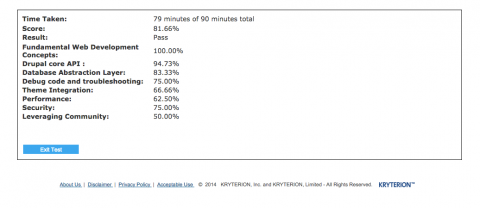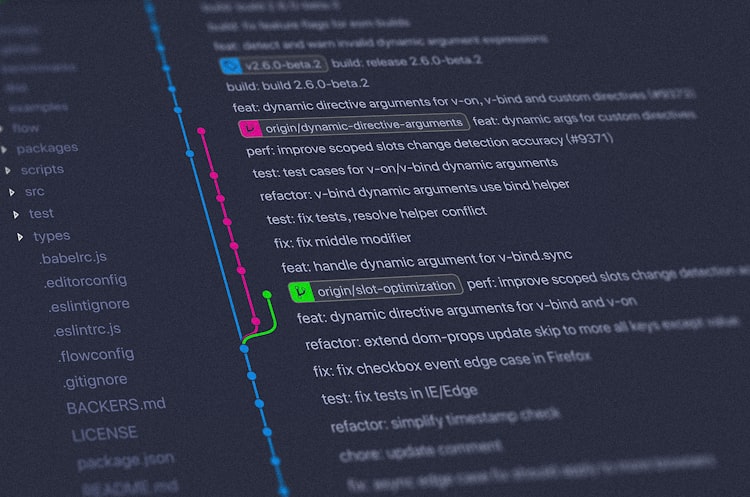Becoming Acquia Backend Specialist Certified

For the most recent Acquia Professional Services All Hands in Boston I took the Acquia Backend Specialist certification and passed! Following the helpful blog articles about the general certification from Tanay Sai and Webchick, I felt it was only responsible to speak about my experience during the backend exam.
One of the key differentiators between those of us involved in Drupal development is whether we err more towards the backend or the frontend. There are of course those who excel in both but generally I've found people to specialise more in either module or theme development. Because I suck at theming (I mean have you seen my website?), I consider myself more of a backend specialist. For me, the backend begins with a bare server (and Red Hat based OS installed) and ends when Drupal starts to create markup for a beautiful site. In this exam however, backend doesn't delve further than the application layer.
The examination experience was a little different to the generic exam which I took at home. Instead of being invigilated by someone spying on my through my webcam, I was observed by the Acquia Learning Services team to ensure I didn't crack open a copy of 'Drupal 7 Module Development' when nobody was looking. I'd recommend this method of taking the test over the slightly more intrusive webcam watching. If you get a chance to attend a DrupalCon and you're offered the option of becoming certified there; do so!
Sections
Each of the sections being looked at for applicants is available on the blueprint page for the backend exam. The key areas to look at for the test itself are:
- Drupal core API
- Database abstraction layer
- Debug code and troubleshooting
- Leveraging community
- Performance
- Security
- Theme integration
- Fundamental web development
Each of these sections carries a certain weighting which directly relates to the number of questions that'll be asked about the topics. At 30%, a sound knowledge of the Drupal core API is definitely something you'll need to pass the certification.
Preparation
Based on the sections being examined and the percentages attributed to each section, I'd recommend studying up at least on the areas you identify yourself as weak on before trying. For me, I revised some of the intricacies of the Database API within Drupal. Whilst I often rely on api.drupal.org during development when I get unstuck, this test prohibits access to external resources. Being able to commit a few things to memory quickly just before the test allowed me to accurately answer questions I may not have been able to otherwise.
I also read up on some of the changes that PHP 5.4 and 5.5 brought in over the now EOL 5.3. Namespacing, traits, shorthand array syntax ($array = [];) and general OOP practices came up for me so do ensure you're aware of the new PHP hotness.
Tips
- Since the questions are either multiple choice or multiple response (select one or many), then for those questions you're unsure of there's no penalty in taking a good guess;
- Blast through the questions you're confident of and mark any questions you're unsure of so you can come back at the end with a fresh frame of mind;
- At 90 minutes and 60 questions you should be spending around 90 seconds on each question. If you find yourself staying on a question for over that, mark it and move on; and
- Settle in for the 90 minute stretch when you sit down. If that means getting water, food or taking a bio-break prior then do that.
Why you should take the certification
I don't want to repeat the already well written discussion about the merits of Drupal certification; I will however try to quantify why I took the certification. Being in the Drupal community, around amazing developers and those learning alike, the most I have to go on about how experienced someone is comes either from the number of commits on their Drupal.org profile or from speaking with them or their peers.
This same experience must hold true for people who've just met me and want to know where I stand in the community. Whether it's clients, other community members or even people who listen to me speak at conferences, none have an accurate representation of me as a Drupalist. With a general Drupal certification and now a backend specialist certification there exists a qualitative measure of my knowledge.
What I got
So I passed the test, but what did I get for each section?

I could certainly improve my scores in some of the sections and I should definitely touch up my understanding of how to leverage the community. That being said, my knowledge is improving all the time just by being a part of the Professional Services team and if you want to become a part of this amazing team then get in touch because we're always hiring.





